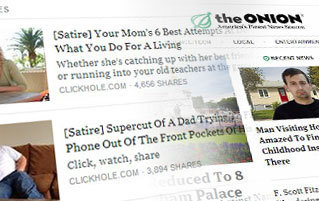4 Reasons Facebook Is Actually Making the World Less Stupid

Facebook has officially debuted a "satire" tag to clearly mark fictitious headlines that show up in your feed, and people are reacting as if the harlequin personification of fun itself has been taken out behind the shed and beaten to death with rakes.
This tag's raised all kinds of philosophical questions, such as "Where does our responsibility as a society to protect people from their own stupidity end and their responsibility to not believe that Kim Jong-un was voted sexiest man alive begin?" And "Won't spelling things out in small words make people even dumber?" Or even "Doesn't labeling satire defeat the purpose of satire?"
We feel that the satire tag is not only necessary but a potential boon for all mankind. Because ...
The Onion Isn't the Only Place That Runs Fake News
There are entire websites devoted to making fun of people who mistake articles by The Onion and Clickhole for unvarnished pieces of actual journalism, and rightfully so. If your immediate reaction to an article about the supernatural powers of Adam Sandler is to reach for the share button with grim, stone-faced purpose, you deserve to be laughed at.

To be fair, every trailer for a Sandler movie is predicting a horrible tragedy.
So when Facebook announced its plans to stamp a satire tag on every fake story shared by its users, tons of people -- including The Onion itself -- responded with a critical mass of self-congratulating derision. But the thing is, comedy sites like The Onion and Clickhole aren't the only places on the Internet that run fake news stories. There is an entire industry devoted to churning out legitimate-sounding headlines under well-hidden satire disclaimers, apparently operating under the assumption that "satire" and "lying" share an identical definition.
For example, right after the news of Paul Walker's death last November, one of the most popular links circulating was a report from the not-obviously-untrustworthy Media Mass claiming the whole thing was a hoax, complete with fake quotes from Walker's representatives insisting that the actor was totally fine. There were no jokes or absurd claims of alien abduction to indicate that the report was 100 percent untrue, unless you happened to click around the website long enough to notice that, according to Media Mass, there appears to be a bizarre epidemic of celebrity dogs with the same name needing surgery.

"Haha, BOOM, Joe Mantegna! Roasted!"
It turns out that Media Mass constantly recycles the same handful of made-up articles and just swaps out celebrity names. We're not sure how that accomplishes their mission statement of "media criticism through satire," because, as we previously mentioned, "satire" does not mean "print whatever the fuck you want and insist that it's the truth." Unless their media criticism is "Look at what we can get away with!" in which case Media Mass is utterly genius.
And Media Mass is only one of countless sites walking the fake-news beat, including Empire News, National Report, and The Daily Currant. Nothing about any of those names indicates that they are villainous fonts of lies that cannot be trusted, so if you saw their headlines in your Facebook feed, nobody could really blame you for believing that a super volcano at Yellowstone National Park was about to erupt or that obesity in Russia recently fell thanks to a ban on American junk food. There's no excuse for falling for that Sandler thing, though. That's just ridiculous.
Even Smart People Fall for Satire
As evidenced by the ongoing series of articles we've dedicated to pointing out, even reputable news sites will occasionally publish stories that are spectacularly false without bothering to double-check their sources. This is especially troubling considering vetting sources is supposed to be a major part of journalism. How hard is it to take five seconds to do a keyword search on Snopes?

"Oh, that site's full of lies. I read it on my aunt's co-worker's timeline."
According to Dannagal Young, a professor of communication currently studying irony comprehension, it's actually harder than you think.
See, irony is all about context, and, as Young points out, social media is impressively shitty at providing that. To wit: the recent #CancelColbert controversy erupted after Stephen Colbert made a joke on his show about showing the Asian community he cares "by introducing the Ching-Chong Ding-Dong Foundation for Sensitivity to Orientals or Whatever." This statement is an obvious example of cosmic racism, until you realize that on the show he was saying it to make fun of the owner of the Washington Redskins for paying lip service to aiding the Native American community. Of course, if you didn't see the show and just read that quote on Twitter or Facebook, you would have no way of knowing that. There's also the fact that The Colbert Report is a parody news program, but you can't expect controversy-hungry Internet users to do any extra critical thinking of their own.
Consequently, it turns out that 140 characters just isn't enough to sufficiently convey the nuance and subtlety of satire, and a random link on Facebook may not be enough to clue you in that you're looking at a parody site. Even reasonably sharp people can miss a lot of context cues while idly scrolling through their news feed. You've probably seen a handful of headlines today that you committed to memory for later discussion at work or among friends without bothering to actually read the articles, and we know you've got a good head on your shoulders. So don't act like it's only barely literate hysteria drones who need to be explicitly told whether or not a viral story is bullshit.

Seriously, we're on like part 287.
Its Effects Are Far-Reaching
"But Cracked," you may be saying, "shouldn't the solution be to encourage people to be more proactive about investigating the things they read and hold these sites accountable for their nonsense horseshittery instead of slapping ridiculous warning labels everywhere?"

"He's arguing with his computer again. Please send security."
While it may seem like stamping a big "HERE THERE BE JOKES" disclaimer onto everything like a fanciful old treasure map might make the problem worse by discouraging us to do even less thinking for ourselves, there's actually a compelling argument to the contrary. Alex Goldman, producer of NPR's On the Media, believes that providing people with constant reminders of what satire looks like will actually make them more able to spot bullshit news stories without Facebook's help, sort of like joke training wheels.

"OK, I'm going to hold you for the first few clicks, then let go ..."
As for holding the media accountable, the industry has started thinking long and hard about ways to fix the flaws in the system that allow non-comedy fake news sites to proliferate in the first place. It's caused a big push for more stringent fact-checking by legitimate news organizations (a standard which never should have been lowered just because journalism moved from print to the Internet) and media-literacy education, which is another way of saying "somehow require people to read an article in its entirety before sharing it on Facebook." The satire tag was essentially designed to make itself obsolete in a best-case scenario, so let's not give it tons of crap before it's had a chance to prove itself, or else we're no better than the bully in a 1980s teen movie.
It's Part of a Larger Campaign to Remove Bullshit From Your Feed
Now, at first glance the satire tag looks like something designed to help fart-smelling drool buckets separate obvious make-believe from fact-drenched reality, but Facebook might actually be more concerned with sparing the rest of us from people who cannot resist hammering their share buttons like spastic jackhammers and clogging our timelines with irritating ridiculousness. You see, besides joke headlines and obvious lies, there's another category of article that will be unceremoniously scarlet-lettered -- insipidly underwritten articles bearing the unmistakable stench of Upworthy-style clickbait.
These are the links that flood your feed with ambiguous headlines designed to trick you into clicking on them before ultimately disappointing you, such as "A Suicide Note From Halfway Across the World Inspired an Unusual Classroom Lecture" (which Upworthy Spoilers aptly sums up as "teacher is anti-bully") and terrible parody videos disguised as actual news items. They rank somewhere between junk mail and getting stabbed in the eye with junk mail, and Facebook is doing something about it.

In a Time of Uncaring CEOs, the Stand This One Took Will Leave You Speechless
They've designed a filter that measures two variables: how long users stay on a page once they've clicked a particular link, and how many likes and shares that link receives. Since the sites supplying the clickbait care only about getting your sweet, sweet revenue-generating clicks and don't give a whistling pig shit whether their content actually delivers anything worthwhile, most users will spend only a few seconds on a clickbait link without bothering to like or share it. Once Facebook identifies a link as clickbait, it cuts that motherfucker from your feed like the cancerous tumor that it is.
With this process in mind, the satire tag seems like it may be less about holding the hands of morons and more about making sure you don't have to deal with them. If Facebook is taking the time to tell your friends that no one is actually building an abortionplex, it means you don't have to, freeing up valuable time that can be spent maintaining your Farmville crops. Now if only Facebook would create an option to block annoying comments from friends of friends that we don't even follow, this dazzling future we live in would finally be all it was meant to be.

"She makes Jenny McCarthy seem logical."
Manna supports Facebook's mission pretty much exclusively on Twitter.
For further missives from the dumber side of the Internet, see the latest entries in our infinity-part series on B.S. Stories That Fooled Your Friends on Facebook.
